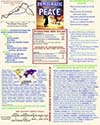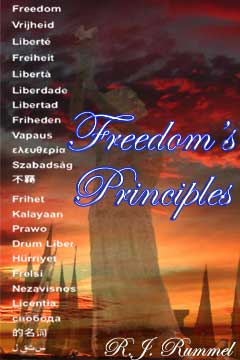[First published February 9, 2006] Whenever I give a speech on the democratic peace to university audiences, questioners always shift the focus to the United States, and especially this kind of question:
Has not the U.S. intervened in many countries, some democracies such as Chile, Guatemala, and El Salvador, supported death squads murdering rebels, and behind the scenes helped mass murder, such as in Indonesia?
Even if true, none of these events was a war. No collection or list of international wars includes them. They are therefore irrelevant to the proposition that democracies do not make war on each other, and cannot be used as evidence to disprove it. As to democide, I have only counted those governments directly responsible. If one were to also count indirect responsibility, then this would have to be done not only for the U.S., but all regimes, including those of Stalin, Mao, and Hitler. I bet that if this were done, the proportional differences between democracies and nondemocracies would be even more weighed toward totalitarian regimes.
To understand why a democracy like the U.S. would be allying itself with dictators, one has to understand that in the late 1940s to the late 1980s, American foreign and defense policies were geared toward containing communism, and responding to the realistic fear of a Soviet Invasion of Europe or a nuclear first strike on the U.S. This Cold War was World War III, with hot battlefronts in Korea, Cambodia, Vietnam, and Afghanistan; and with theaters of related guerrilla warfare, subversion, spying, and political action throughout Central and South America, Africa, and Asia. Within this context, American alliances, and ties to “right wing” dictators, or interventions to prop them up, were meant to prevent their communist takeover or revolution, and/or to secure their support of our side in the Cold War by, for example, providing basis. There has been much criticism of this among academics, but strangely, there has been no similar criticism of the American alliance with Stalin to defeat Hitler in World War II. Yet, of all regimes, Stalin’s was worse than any military or authoritarian regime we supported after the war, and on par with Hitler’s.
One example always brought up is the 1973 military coup in Chile against an elected president that America presumably engineered. To many on the left it is the proof of American imperialism and true antidemocratic nature. But, the U.S. did not intervene against President Allende, or help overthrow him. See my “The Chilean Coup–Icon of the Anti-American Left.” The coup against him was an internally generated matter. The U.S. did favor it, however. Keep in mind that Allende was a communist, aided by Castro and the Soviet Union, and was attempting to convert Chile to a communist dictatorship, like that of his model, Castro. By the time of the coup, Allende had destroyed virtually all his pubic support, including the unions, business, the church, and, of course, the military.
World War III has been won, communism defeated as a competing and threatening world force, and there is no longer a perceived need to contain it. If people are stupid enough to elect communists, as they have done in Venezuela, and Bolivia, so be it. People who don’t learn from history, will have to repeat it.
In any case, in general, where the U.S. has intervened, and supported dictators under communist threat, these countries are now democracies. In two notable cases where we could have intervened and did not, the worst not only happened to these countries, but the horrible result continues to this day. Think of Cuba for one, where President Eisenhower refused to save the Fulgencio Batista regime from Castro, until it was too late. Then President Kennedy inherited Eisenhower’s plans to overthrow Castro with the Bay of Pigs invasion by Cuban expatriates, which was miserably prepared and handled. Of course, had we supported Batista, we would be hearing to this day about American imperialism and intervention to save right wing Batista, but had we done so we would have saved tens of thousands of lives, and the Cuban people from a miserable existence under communism. And by now, Cuba would probably be a democracy, as are El Salvador, Brazil, Chile, the Dominican Republic, and Guatemala.
Then there is Iran. At the time of the Ayatollah’s 1978-1979 revolution, Iran was led by a pro-American and secular modernizing dynasty, much to the rage of the Iran’s Ayatollahs and Islamic extremists. When the dynasty was on the verge of collapse, the Iranian military contacted President Carter asking for support for a military takeover — a protective coup. Typical of his softheaded worldview, Carter refused, and in effect gave a go ahead to the Ayatollah’s revolution. We now all know the result in the hundreds of thousands murdered, the infliction of totalitarian Islamic rule on a people, and the danger of its revolutionary regime producing nuclear weapons The irony of this is, as with Cuba, had we supported a coup this would have become another black mark against the United States.
Foreign and defense policy in wartime, which included the Cold War, and now the War on Terror, is messy and shot through with moral ambiguities and compromises. Thus, we dropped a-bombs on Hiroshima and Nagasaki; allied ourselves with the fascist Chiang Kai-shek regime of China, and the communist megamurderer Stalin; and agreed to turn over Eastern Europe to Stalin’s tender mercies after the war. Now we are allied with Pakistan and Saudi Arabia, among other distasteful regimes, who are hardly models of democracy. It all boils down to the balance sheet of pluses and minuses in defending freedom and waging peace.
But, then those pure in heart, innocent in mind, and morally self-righteous, will always find something in such foreign and defense policies to attack, while assuming no responsibility for the inevitable consequences. Witness the Patriot Act, alleged torture of terrorists, and the Al Qaeda NSA surveillance (“Bush spying”) program.








Apologist.
Genocides and banana republics all in the name of american greed and pride, right wing pro US dictatorships, slaughtering the democratic opposition so that a few more dollars can be stolen. That is americas legacy, a armed robber and school yard bully on the world stage.
Hah!
Tell me then why America funded a CIA coup which paid criminals in Iran to overthrow the ONLY DEMOCRACY IN THE MIDDLE EAST AT THE TIME, Iran? It was because Iran had decided to nationalize its oil and America did not want a threat in the cold war.
Tell me why America supported Hussein in the Iran/Iraq war, where he used bioweapons against kurds in the mountains, his own people, and the iranians, where women wre frozen in the act of covering their children, trying to protect them from the gas.
Tell me why America supported the rise of the taliban in Afghanistan, and in the Russian/Afghanistan war paid the most money to the most extreme muslim groups because it believed the most extreme ones would fight Russia best. Why did America tell muslims of other arab nations it was their duty as jihad to fight against the invading atheist Russians when in Reality it was just an invasion? Why did America create the modern terrorism we know today (this never existed under the ottoman empire, so Islam obviously is not to blame). America supported Taliban since it also believed taliban would allow it to put an oil pipe underneath.
Do you have an answer to these other than the fact that America rarely puts basic human rights before its own interests (in many cases oil)?
Have you heard about the Cold War?
yes, I have heard of the Cold War, and obviously America did not think ahead enough to think about the consequences of supporting extremists in any religion and training them to disembowel and do espionage….